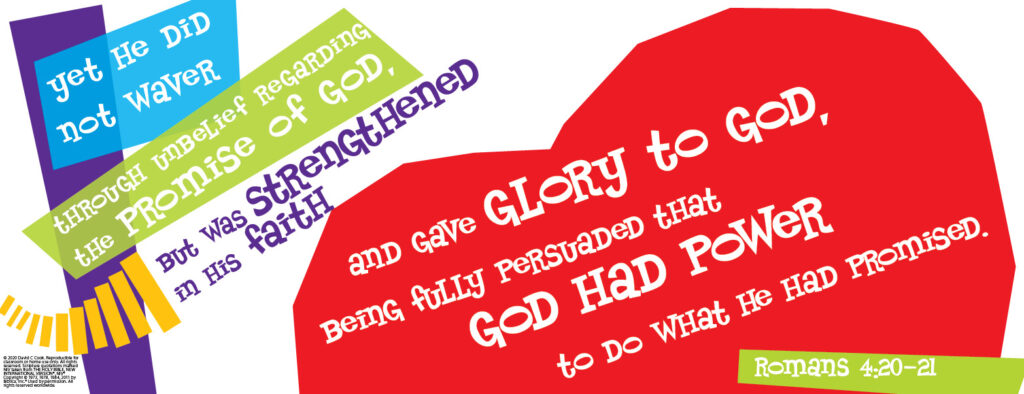During the lesson, the information for you to know is written in regular type, and what we suggest speaking or reading aloud to children is in bold. All resources for this lesson, including the Teacher Guide and Student Page, can be downloaded in a ZIP file by clicking on the following link:
In some lessons you will find "resource articles." These are articles written by experts from around the world to help equip you for your work with children and adolescents. Share them with parents or guardians if you consider it appropriate.
[Abraham] did not waver through unbelief regarding the promise of God, but was strengthened in his faith and gave glory to God, being fully persuaded that God had power to do what he had promised.
Romans 4:20–21
Abraham and Sarah were old and childless. But God had made Abraham a promise—he would become the father of many nations with more descendants than there are stars. Abraham was a man of conviction. He believed God had the power to do what He had promised. So Abraham kept believing.
Even when his circumstances seemed impossible, Abraham held firmly to his convictions about God. As you prepare your heart for this lesson, make a list of the convictions you have about God—the beliefs you hold so strongly that they affect every part of your life. Then ask the Holy Spirit to prepare the children’s hearts to believe these truths.
Let the families of the children know that you are beginning a 4-lesson unit about conviction. Give them the definition for “conviction” that their children will learn: conviction is a strong belief that influences our attitudes and actions. Encourage them to talk with their children about convictions they have. They can start by sharing a simple, non-spiritual one such as: I have a conviction that food is important to my body, so I will eat.
Teacher Tip: If possible, email or text the Family Connection Card to the families of your students.
Play a game of catch with your group. Toss a ball or small stone to any child in the circle and ask her to pass it to any other child. As play continues, tell the group there is only 1 rule to the game: No one can keep the ball or stone for longer than one second before passing it to another player. After a short time, take the ball or stone and start tossing it up and down to yourself. Tell the children that you do not like the rule anymore and you want to play by yourself. Allow the children to respond, then after 1 or 2 minutes, have everyone sit around you.
Over the next 4 lessons, we are going to talk about something called “conviction.” Conviction is a big word, but its meaning is simple. Conviction means holding on to a belief so tightly, with such strength, that it has the power to influence everything you think, say, and do.
Many of you hold a strong conviction, or belief, that it is important to follow the rules when you are playing a game. When my actions did not match your conviction, you let me know.
For Christians, conviction means having a strong, unshakable faith in God that influences the way we think, act, and treat others. Conviction can inspire ordinary people like you and me to achieve extraordinary things.
Here are some examples of convictions. These are convictions that anyone could have, whether or not he is a Christian. Remember, convictions are strong beliefs that influence one’s actions.
It is my conviction that gravity always works, so I will not jump off tall buildings.
It is my conviction that others trust people who always tell the truth, so I will always tell the truth.
It is my conviction that taking drugs is dangerous, so I will never take them.
Allow 2–3 children to share their thoughts. Their convictions can be simple or spiritually meaningful. If children struggle to think of convictions on their own, share these 2 as examples: It is my conviction that my body needs food to live, so I will eat. It is my conviction that God hears and answers my prayers, so I will pray and take time to listen to what God says to me in my heart.
A person of conviction is someone whose convictions are so strong that it affects the way she lives her life. Today we will hear the true story from the Bible about a man of conviction and faith named Abraham.
Abraham was a man with a huge conviction. He believed in God so strongly that no matter what God told him to do, he did it. His conviction led to one of the most exciting stories in the Bible. I am going to tell it to you.
One day a long time ago, God surprised an old man named Abraham. “I will make you the father of many nations,” God promised.
Abraham wondered how this could be possible, since he and his wife were very old and had no children of their own. How could he have nations of people in his family someday if he had no children at all today? But God performed a miracle. This old couple had a baby! They were filled with joy when their son Isaac was born! He was born when Sarah, Abraham’s wife, was 90 years old and Abraham was 100 years old!
Years later God tested Abraham’s belief in Him. God wanted to see if Abraham’s conviction to follow Him would remain strong even when God gave him something very, very hard to do. God said, “Take your son, your special son—yes, Isaac, whom you love deeply—and sacrifice him to Me.”

Although his heart probably felt torn into pieces, Abraham never gave up his conviction to follow God. He also believed God’s promise that he and Sarah would be the father and mother of many nations. That would mean they would have to have children, and Isaac was their only child. Would God perform another miracle and bring Isaac back to life after the sacrifice?
Abraham knew that child sacrifice had never been something God wanted or asked for. Puzzled, but believing, Abraham obeyed God by preparing an altar just as God directed. He laid Isaac on that altar and lifted the knife to sacrifice his special son. Let’s read the next part of the story directly from the Bible.

Read Genesis 22:11–12 aloud directly from your Bible.
But the angel of the Lord called out to him from heaven, “Abraham! Abraham!”
“Here I am,” he replied.
“Do not lay a hand on the boy,” he said.
“Do not do anything to him. Now I know that you fear God, because you have not withheld from me your son, your only son.”
Genesis 22:11–12
With strength and conviction, Abraham believed in God, his spiritual Father. God saved Isaac and blessed Abraham with descendants as numerous as the stars in the night sky.
Allow children to share their thoughts. If needed, suggest the following ideas: Abraham had the conviction that God knew what was best, even if it did not make sense to him at that point. Abraham had the conviction that God would keep His promise and make him and Sarah the parents of many nations. Abraham had the conviction that obeying God is better than disobeying Him.
Allow children to share their thoughts. They may suggest that Abraham was willing to sacrifice Isaac because of his convictions. Point out to the children that Hebrews 11:19 tells us that Abraham was willing to obey God because he had the conviction or faith that God could raise his son from the dead.
Many, many years later the apostle Paul wrote about Abraham and his strong conviction in a book of the Bible called Romans. Listen carefully to how Paul describes Abraham in these verses. I will read them 2 times.
[Abraham] did not waver through unbelief regarding the promise of God, but was strengthened in his faith and gave glory to God, being fully persuaded that God had power to do what he had promised.
Romans 4:20–21

Allow 2–3 children to share their thoughts.
Yes! Abraham had a conviction, or strong belief, that God has the power to do what He promises. God promised Abraham that he would have more descendants, or family members, than there were stars in the sky, and Abraham believed Him. When God asked Abraham to sacrifice his special son, Abraham was willing to obey. He trusted God and believed His promises.
Optional: If you are using The Action Bible, the children can review the story on pages 60–63.
Have children pair up. They should still be able to see and hear you clearly as they sit with their partners.
Abraham is a great example for us and for all Christians! He had convictions about God and lived his life according to those convictions. You have the opportunity now to respond to what you have learned by thinking about practical ways you can live your life according to your strong beliefs, or convictions. You may have convictions about God like Abraham did. If you do not know God yet, you may have other convictions.
Explain to the children that you are going to read 3 conviction statements. You will end each conviction statement with the words, “Therefore, I will________.” After each statement, children will think about 1 practical action they can take that matches that conviction and share their ideas with their partners.
Conviction 1: I believe God’s promise that He will never leave me. Therefore, I will _____________________________________.
Give children time to think and share with their partners. If they struggle to think of an action they can take, suggest the following: I will talk to God when I am sad, scared, or lonely.
Conviction 2: I think that people trust those who do not lie. Therefore, I will _____________________________________.
Give children time to think and share with their partners. If they struggle to think of an action they can take, suggest the following: I will tell the truth.
Conviction 3: I think that happiness spreads when you are kind. Therefore, I will _____________________________________.
Give children time to think and share with their partners. If they struggle to think of an action they can take, suggest the following: I will share some food with a friend or help someone who needs help.
Ask 3–4 children to share what actions they will take this week based on their convictions.
Many of you already hold some good convictions. If you are a Christian, you make decisions every day that line up with what you believe to be true about God, just like Abraham did.
If you already hold these convictions, or if you want God to increase your faith in Him and help you believe, take your hand and place it over your heart as you repeat these 3 convictions after me. Think about each one as you say it. Allow each truth to enter your heart as you say the words!
Some of you may not trust God like Abraham yet. That is okay. You can still repeat the conviction with everyone, but do not yet place your hand over your heart. If you have doubts, tell God. Be honest with Him. Ask Him to help you believe.
Have children stand quietly. Read each conviction and pause for the children to repeat it before reading the next one.
Conviction: I believe God’s promise that He will never leave me.
Conviction: I trust that God knows what is best for me.
Conviction: I am confident that what I believe about God is true.
During the next 3 lessons, we will talk more about conviction—holding a value or belief so firmly that it influences our attitudes or actions.
Optional: If you are using Student Pages, allow the children to write their own convictions on their pages.

Reminder: All resources are available for download at the end of this lesson.
Close class by praying this blessing based on Romans 4:21:
Blessing: God promises to never leave you. He loves you and always wants what is best for you. May you, like Abraham, always believe that God has the power to do what He has promised.
Lead the children in singing “Blessed Be Your Name” again, if possible.
Life on Life ©2020 David C Cook. Reproducible for home or classroom use only. All other uses require written permission from David C Cook [email protected]. All rights reserved.